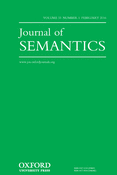-
Views
-
Cite
Cite
Lara Hochstein, Alan Bale, Danny Fox, David Barner, Ignorance and Inference: Do Problems with Gricean Epistemic Reasoning Explain Children’s Difficulty with Scalar Implicature?, Journal of Semantics, Volume 33, Issue 1, February 2016, Pages 107–135, https://doi.org/10.1093/jos/ffu015
Close - Share Icon Share
Abstract
Unlike adults, children as old as 9 years of age often fail to infer that a sentence like, ‘Some of the children slept’ implies the falsity of its stronger alternative, ‘All of the children slept’—an inference referred to as a ‘scalar implicature’. Several explanations have been proposed to account for children’s failures with scalar implicature, including domain-general processing limitations, pragmatic deficits or an inability to access the relevant alternatives in a lexical scale (e.g. all as an alternative to some ). Our study focused on the role of Gricean epistemic reasoning in children’s failures by testing their ability to compute ‘ignorance implicatures’, which require reasoning about speaker knowledge and informativeness but which differ from scalar implicature with respect to the alternative statements that are involved. We administered two matched tasks to 4- and 5-year-old children: one that assessed their ability to compute ignorance implicatures, and another that assessed their ability to compute scalar implicatures. Five-year-olds successfully computed ignorance implicatures despite failing to compute scalar implicatures, while 4-year-olds failed at both types of inference. These results suggest that 5-year-olds are able to reason about speaker knowledge and informativeness, and thus that it is difficult to explain their deficit with scalar implicature via these factors. We speculate about other possible sources of their difficulties, including processing limits and children’s access to the specific scalar alternatives required by scalar implicature.



